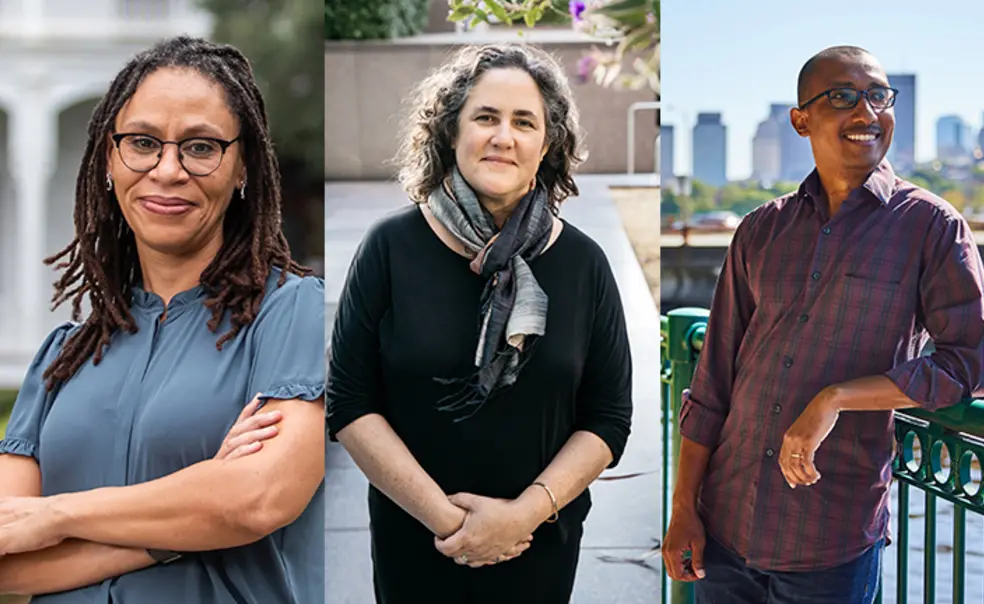Three Princeton Alumni Win 2023 MacArthur Genius Grants
Recipients receive a “no strings attached” award of $800,000 over the next five years
The Macarthur Foundation announced in October that three Princeton alumni — Andrea Armstrong *01, Diana Greene Foster *98, and Lester Mackey ’07 — are among the newest class of MacArthur fellows.
Each of the 20 recipients in the 2023 cohort will receive a “no strings attached” award of $800,000 distributed over the next five years from the MacArthur Foundation.
Armstrong, who received her master’s in public affairs from the School of Public and International Affairs (SPIA), was recognized for “bringing transparency to detention policies, conditions of confinement, and deaths in U.S. prisons and jails.” She is a professor of law at Loyola University New Orleans’ College of Law and founder of Incarceration Transparency, a database with information on deaths of those incarcerated in Louisiana.
“My work focuses on … the conditions in which people live and unfortunately die in our prisons, jails, and detention centers … including the ways in which [deaths are] hidden from public view, and trying to understand who was dying, why they’re dying, and how we can reduce these deaths behind bars,” says Armstrong. She credits her time at SPIA with helping her to analyze statistics and envision new policies.
“The skills and the things that we learned [at SPIA] — those transfer across so many different domains. I’m just incredibly grateful for it,” she adds.
“I thought, what a satisfying life it would be if I could do this work that I find satisfying on an intellectual level, but it also could translate into something that’s helping the people in the world around me.”
— Lester Mackey ’07
2023 MacArthur fellow
Armstrong is motivated in part because “when we think about who are the people who are least protected by law, in many cases those are incarcerated people.” She hopes to increase transparency around confinement and eventually aims to work herself out of a job by proving the government can and should collect and publish more information around incarceration.
Foster, who received her Ph.D. from SPIA, is a professor of obstetrics, gynecology, and reproductive sciences at the University of California, San Francisco. The MacArthur Foundation cited her work “investigating how reproductive health care policies and access impact individuals’ physical, mental, and socioeconomic well-being.”
After realizing there was a lack of data around the question of whether abortion harms women, Foster and collaborators conducted the Turnaway Study, “and what turns out to be important from having done the study is not harm that’s caused by abortion, but harm that’s caused by people not being able to get an abortion. And we see that in worse economic outcomes, worse physical health, and worse outcomes for their children.”
The study found that 95% of those who received abortions said more than five years later that it was the right decision for them.
Foster told PAW her research was influenced by her years at Princeton, when she went from receiving a yearly prescription of birth control pills from University Health Services to a three-month supply after switching to private insurance. “It made me so mad because I knew that the Princeton model was better.”
Foster plans to spend some of the award money to help fund The Turnaway Play, a production written by her sister, Lesley Greene, about Foster’s own research, which is set to debut in Ithaca, New York, in May 2024.
Mackey, who received his bachelor of science in engineering (BSE) in computer science, was commended for “pioneering statistical and machine learning techniques to solve data science problems with real-world relevance.” According to the MacArthur Foundation, his work “focuses on techniques to improve efficiency and predictive performance in computational statistical analysis of very large data sets” that he uses to “develop scalable learning algorithms with direct benefit for society.”
Mackey has been a machine learning researcher with Microsoft Research New England since 2016.
“I use computer science and statistics and math to help solve problems in the world, and I’ve gotten to work on a wide variety of problems,” he says.
Mackey’s past and present projects include monitoring seismic activity as part of the United Nations’ Comprehensive Nuclear-Test-Ban Treaty, improving weather forecasts two to six weeks in advance, and, with his wife, Lilly Fang ’07, a former attorney who is now in software engineering, predicting disease progression of Lou Gehrig’s disease (amyotrophic lateral sclerosis, or ALS).
Mackey was first drawn to this work in high school after receiving a book on careers from his mother. Computer science stood out because it is mathematical and practical, “and that appealed to me because I love math, but I also wanted to see the concrete practical impacts of my work in the world,” he says.
“I thought, what a satisfying life it would be if I could do this work that I find satisfying on an intellectual level, but it also could translate into something that’s helping the people in the world around me.”
The MacArthur Foundation encourages individuals to pursue professional and passion projects without restriction, according to the foundation website, and the awards represent “an investment in their potential.” This year’s cohort also includes Courtney Bryan, a composer and pianist who was a postdoctoral research associate in Princeton’s African American studies department from 2014 to 2016, according to the University.










No responses yet